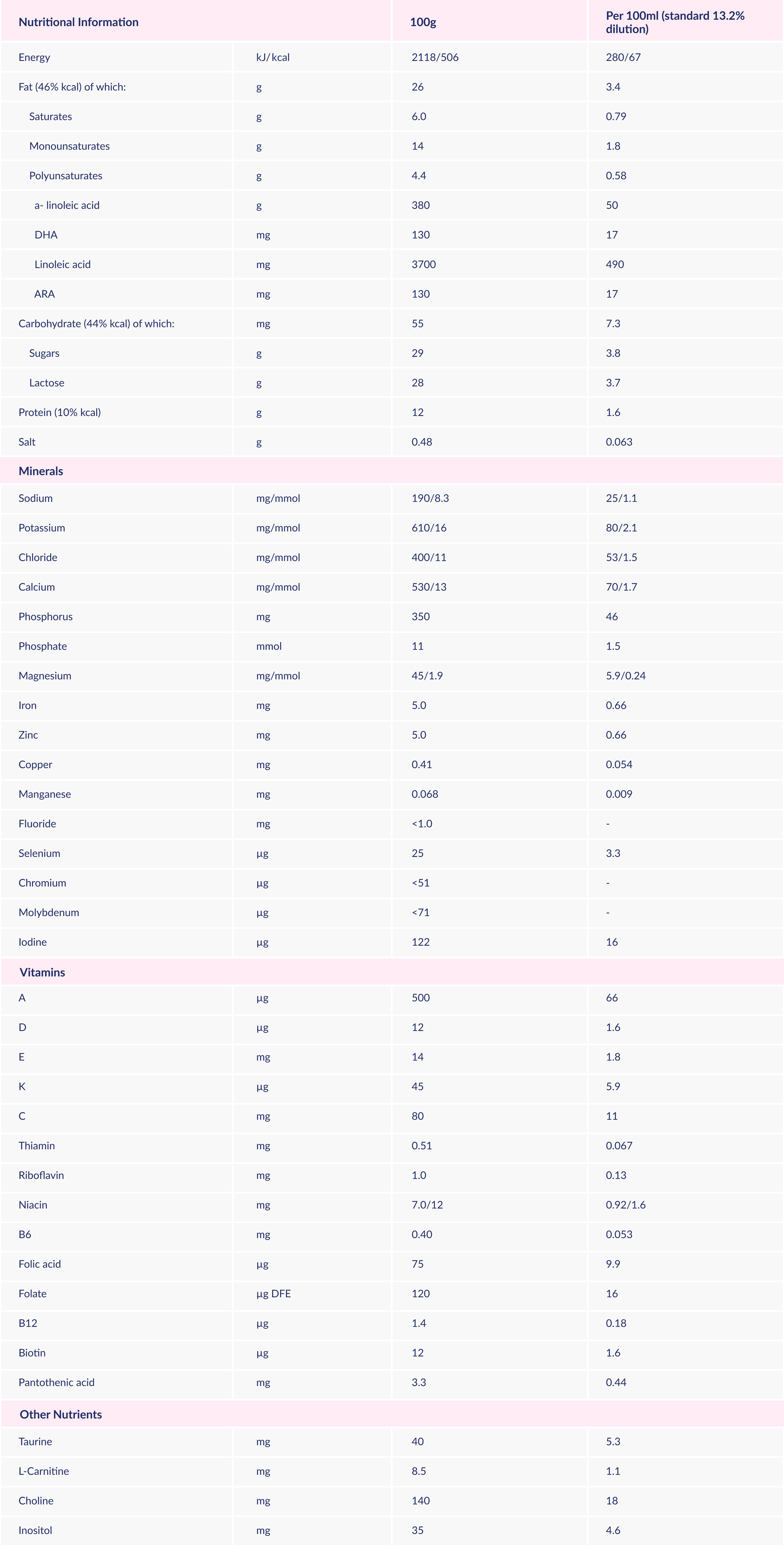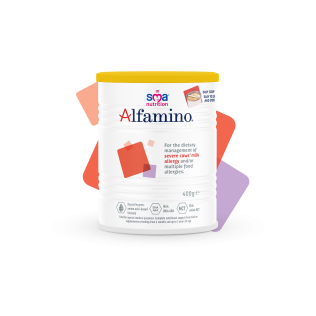SMA® Althéra®
Whey based extensively hydrolyzed, nutritionally complete hypoallergenic speciality formula with purified lactose for effective first-line symptom relief in cow’s milk
protein allergy (CMPA).
For complete nutritional support from birth and supplementary feeding from 6 months and up to 3 years of age
Preparing SMA® Althéra® is very similar to how you prepare standard infant formula. The step-by-step instructions on how to prepare SMA® Althéra® are:

STEP 1 Wash hands thoroughly before preparation.

STEP 2 Wash bottle, teat and cap.

STEP 3 Sterilise equipment (by boiling for 5 minutes or with a cold water sterilising solution).

STEP 4 Boil drinking water for 5 min, allow to cool for no longer than 30 minutes.

STEP 5 Pour exact amount of water into bottle as per feeding table on tin.

STEP 6 Add exact number of level scoops for age of babyas per feeding table on tin.

STEP 7 Shake bottle until powder fully dissolved. Use immediately and do not keep unfinished bottle, discard contents.

STEP 8 Close tin tightly after each use and store in a cool, dry place. Must be used within 3 weeks of opening.
WARNING “Unboiled water, unsterilsed bottles or incorrect dilution can make your baby ill. Incorrect storage, handling, preparation and feeding can also lead to adverse effects. Follow instructions carefully.”
| AGE | QTY PER FEED (ML) | QTY PER FEED (SCOOPS) | FEEDS PER DAY |
|---|---|---|---|
|
1-2 weeks
|
90
|
3
|
6
|
|
3-4 weeks
|
120
|
4
|
5
|
|
2nd month
|
150
|
5
|
5
|
|
3-4 months
|
180
|
6
|
5
|
|
5-6 months
|
210
|
7
|
5
|
|
From 7th month**
|
210
|
7
|
3-4
|
lactose, maltodextrin, vegetable oils (suflower, rapeseed, coconut),extensively hydrolized whey protein (milk), minerals (calcium glycerophosphate, potassium phosphate, magnesium chloride, calcium chloride, sodium chloride, manganese sulfate, ferrous sulphate, potassium iodide, sodium phosphate, zinc sulphate, potassium citrate, potassium chloride, sodium selenate, copper sulphate), emulsifier (E472c), fibres (2'-fucosyllactose, lacto-N-neotetraose), mortierella alpina oil (ARA), oil from the micro-algae Schizochytrium sp.(DHA), acidity regulator (E330), choline bitartrate, vitamins (C, E, niacin, pantothenic acid, riboflavin, A, thiamin, B6, folic acid, K, D, biotin, B12), L-arginine, L-histidine, Taurine, Inositol, L-Carnitine.

NE = Niacin Equivalent
DFE = Dietary folate equivalent
DHA = Docosahexaenoic acid
ARA = Arachidonic acid
Osmolarity = 260 mOsm/l
Osmolality = 290 mOsm/kg
- Proven hypoallergenicity with a tolerance of 98.4% in infants with Cows' Milk Protein allergy (CMPA)1
- Provides immune enhancing properties, with purified lactose to support the growth of beneficial bacteria and the production of important short chain fatty acids2,3
- Supports growth and development in infants and young children with CMPA2 – commonly at risk of growth failure and nutritional deficiencies4,5
- Inspired by breastmilk’s specific amino acid profile and with a protein quantity of 9 PE%
- Helps compliance with preferred taste over some casein based extensively hydrolysed formulas
6 - Highest degree of hydrolysis amongst extensively hydrolysed formulas7
Patient Case Example For SMA® Althéra®
NAME & AGE
Edward, 3 months old
DIAGNOSIS
Cow’s Milk Protein Allergy
DIETARY MANAGEMENT
SMA® Althéra®

Case Presentation: Edward
Edward, a 3-month-old boy – was exclusively breastfed for the first 2 months – occasionally topped up with standard infant formula. He experienced frequent episodes of regurgitation/ vomiting, crying (which was very stressful for parents, especially mum) and occasionally loose stools. A family history of atopy (mother) was noted, and he was referred for assessment by a gastroenterologist (GI) by the general practitioner (GP). His CoMiSS® score was 16 (crying 6; regurgitation 6; loose stools 4).
Gastro-Esophageal Reflux Disease (GERD) at 4 months of age. Prescribed Proton Pump Inhibitors (PPIs). Suspected cow’s milk protein allergy (CMPA).
Seen by dietician who recommended skin prick tests (SPT) to cow’s milk (CM). PPIs appeared to help reduce the regurgitation/vomiting symptoms but without full resolution. His weight gain was poor (birth weight 3.4kg weight-for-age z score (WAZ) 0 = normal), current weight 3.6kg (WAZ close to -2). He was prescribed SMA® Althéra® for a trial period of 2-4 weeks. His SPT results were negative. The dietician also advised that he start dairy-free complementary feeding (CF) between 4-6 months of age.
After 1 week mum called to report that Edward was crying less and seemed to be more settled, though still some vomiting and loose stools.
Edward was 5 months of age. His weight had improved – 4.0kg (WAZ again close to 0) - he was regurgitation/vomiting less and his stools were less frequently runny. Mum reported he was much more settled and therefore she was reluctant to challenge him, as she felt her life was getting back to normal, stating ‘’I finally have my baby back’’. They had also started dairy-free CF. The challenge was therefore postponed but agreed with mum to discuss his challenge at 8 months of age. His CoMiSS® score was 3-7 (crying 1; regurgitation 2; stools occasionally 4).
On review he was growing well (5.6 kg, WAZ >0 = normal), progressing on CF – and was a ‘’happier baby’’. The GI had discontinued PPIs as he had significantly fewer regurgitation/vomiting episodes. Mum reported that he had had an accidental challenge (cheese) without noticeable symptoms, therefore she was happy to discuss the challenge with the dietician. The reintroduction of dairy/milk using milk ladder at home was advised. His CoMiSS® score was now 1 (crying 0; regurgitation 1; loose stools 0). By his 1st birthday he was back on standard formula and taking all dairy.


SMA® Althéra® FAQs
Answers to common questions
about
SMA® Althéra®
.
The tin sized of SMA® Althéra is 400g.
It is 4.4g – so 1 scoop of SMA® Althéra is equal to 4.4g of powder.
SMA® Althéra® is suitable for those following a halal diet (halal certified) but is not kosher certified.1 The protein hydrolysate used in SMA® Althéra® is uniquely produced with non-porcine enzymes.1 These enzymes (proteases) are of plant origin. This formula meets the hypoallergenicity criteria of the American Academy of Pediatrics (AAP) and can be used for the dietary management of infants and young children with CMPA.2
- Data on file (Halal certification).
- Nowak-Wegrzyn A, et al. Allergy 2019;74(8):1582-4.
Yes, SMA® Althéra® can be used for infants requiring enteral tube feeding. Instructions need to be followed according to local guidance as well as the patient’s individual nutritional management plan.
Lactose is the largest solid component in breastmilk, representing around 70g/Litre1,2, and breastmilk is the best feed for all infants, including those with CMPA.
It has been suggested that lactose provides beneficial effects on gut physiology, including prebiotic effects, as well as stool softening and enhancement of water, sodium and calcium absorption.3 The European Society of Pediatric Gastroenterology Hepatology and Nutrition (ESPGHAN) position papers (2012 & 2023) considers the complete avoidance of lactose in infants with CMPA to be no longer warranted.3,4 Previous concerns that infants with CMPA would react to residual protein traces in lactose have often resulted in complete avoidance of both lactose and cow’s milk protein.4 However, adverse reactions to lactose in infants with CMPA is not supported by literature. ESPGHAN (2012) suggested that formula containing purified lactose have been found to be safe and effective in the management of CMPA.3
Francavilla and colleagues (2012) demonstrated that an extensively hydrolyzed formula (eHF) with added lactose confers prebiotic benefits in infants with CMPA.5 They reported that the addition of lactose shaped the composition of the gut microbiota by increasing total fecal counts of Lactobacillus and Bifidobacterium species, while decreasing levels of Bacteroides and Clostridia.5 Furthermore, the addition of lactose has been shown to be associated with better product palatability, which could improve acceptance/compliance.6,7
SMA® Althéra® is the only formula in our CMPA (AAA) range which contains lactose. SMA® Althéra® has been developed for the first-line management of CMPA and in hypoallergenicity studies was tolerated by 98.4% of infants with CMPA.8-9 Alfaré® HMO, SMA® Alfamino® and Alfamino® Junior HMO are lactose-free specialty formulas and are all suitable for secondary (transient) lactose intolerance.
- Zivkovic et al. Proc Natl Acad Sci USA. 2011;108(suppl 1) :4653‐4658.
- Zivkovic et al. Funct Food Rev. 2013;5(1):3-12..
- Koletzko S, et al. J Pediatr Gastroenterol Nutr. 2012;55(2):221-229.
- Vandenplas Y, et al. An ESPGHAN position paper. J Pediatr Gastroenterol Nutr. 2023. https://www.espghan.org/dam/jcr:7100468b-c6df-48bc-a566-6b13c427e756/CMA%20ESPGHAN%202022_V31.pdf;
- Francavilla R, et al. Pediatr Allergy Immunol. 2012;23(5):420-7.
- Maslin K, et al. Pediatr Allergy Immunol.2018;29(8):857-62.
- Miraglia Del Giudice M, et al. Ital J Pediatr. 2015;41:42.
- Nowak-Węgrzyn A, et al. Allergy. 2019;74(8):1582-4.
- Nowak-Wegrzyn A, et al. Nutrients. 2019;11:1447.
Discover the Full Range of Options.
We’ve developed nutritional formula solutions.
SMA® Alfamino®
From birth onwards.




